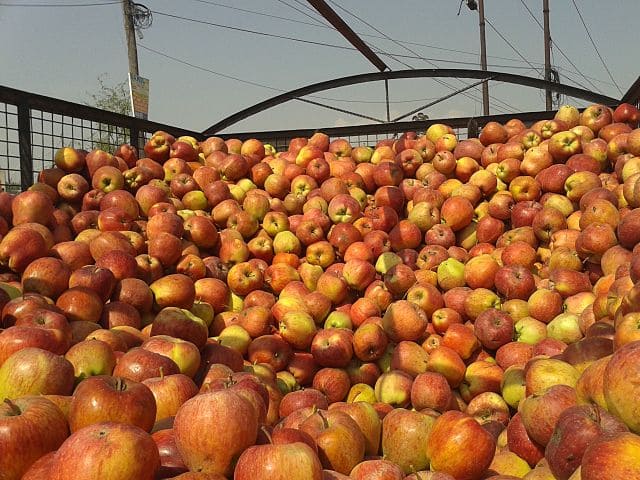Rotten Apples, the Systematic Destruction of Kashmir's Economy and United Nations Millennium Goals5/27/2023 Tazeen Hasan sheds light on the deliberate destruction of the apple crop, a devastating blow to the economic backbone of Kashmiris. In doing so, she exposes it as one of the numerous genocidal tactics employed by the Indian settler colonial regime in Kashmir.
The Indian settler colonial regime in Kashmir persistently employs genocidal tactics against the Kashmiri population. One such strategy involves purposefully targeting apple farmers and individuals affiliated with the apple business, effectively dismantling their economic backbone. Additionally, this brutal settler colonial action has grave ramifications for the environment. According to reports in the Indian media and Kashmiri sources affiliated with Justice For All Canada, the Indian army obstructed the Jammu-Srinagar road during the apple harvesting season in the autumn of 2022, causing the apples to decay in the stranded trucks. Indian channel NDTV confirmed that while other vehicles were allowed to pass, trucks carrying apples were specifically halted. Hence, this was a deliberate and systematic policy rather than an unintentional natural disaster or calamity. With 3.5 million Kashmiris relying on apple farming and business, this ruthless settler colonial policy inflicted significant damage on a population already enduring lockdowns and the COVID-19 pandemic since 2019. This action was so brutal that Mehbooba Mufti, the former Chief Minister of Jammu and Kashmir and a former coalition partner of the BJP, felt compelled to issue a statement alleging that the halting of trucks on the highway was a deliberate attempt to subject the people of Kashmir to suffering. Since 2019, Kashmiri farmers have been grappling with economic hardships, struggling to provide for their families. The apple harvesting season in 2022, however, held the promise of a bountiful income due to an exceptionally abundant apple crop. Nonetheless, the deliberate disruption of transportation shattered their hopes and plunged them deeper into poverty and hunger. With 3.5 million Kashmiris depending on the apple harvest for their livelihoods, the intentional disruption during the peak season poses a grave threat to their economic stability and well-being. Moreover, this action led to the fruits deteriorating and emitting methane gas. Methane, a potent greenhouse gas, significantly contributes to global warming and climate change. The decomposition of organic matter, such as rotting apples, produces methane, which, when released into the atmosphere, exacerbates environmental concerns. The unchecked emission of methane from the decaying apples during the blockade poses risks to local air quality. The long-term consequences of this blockade are even more hazardous. According to experts, methane is approximately 25 times more potent as a greenhouse gas compared to carbon dioxide, making it a significant contributor to climate change. By allowing the apples to rot and emit methane gas, the blockade not only harms the immediate environment but also intensifies the long-term challenges posed by global warming. This underscores the urgency of addressing the repercussions of these settler colonial policies, both in terms of the economy and the environment, to prevent further harm to the well-being of the people of Kashmir and the planet as a whole. The deliberate release of methane gas, both from natural sources and human activities such as agricultural practices, waste management, and fossil fuel extraction, exacerbates the warming effect on the atmosphere. As global temperatures rise, glaciers continue to shrink, setting off a dangerous feedback loop. The melting of glaciers exposes darker surfaces underneath, such as rock and soil, which then absorb more sunlight and further contribute to global warming. Furthermore, the thriving apple crop in Kashmir necessitates significant amounts of water for irrigation, making efficient water resource management crucial. However, the blockade resulted in the wastage of precious water resources that were utilized to nurture the apple orchards. As the apples remained trapped in the halted trucks, the water used for their growth and maintenance went to waste. This not only deprives the local population of a vital resource but also emphasizes the need for sustainable water management practices to ensure the long-term viability of agricultural activities in the region. In summary, the blockade has dire consequences for the local economy and the environment. The deliberate disruption of the Kashmiri local economy raises concerns about a systematic plan aimed at impoverishing and starving the Kashmiri population. It is crucial for global institutions like the United Nations and its relevant agencies to address these issues, protect the livelihoods of millions, and promote sustainable practices that ensure the well-being of both the environment and the people of Kashmir. Ensuring environmental sustainability and eradicating poverty and hunger are two of the eight Millennium Development Goals of the United Nations. The UN and relevant agencies need to take urgent and decisive action against such settler colonial policies of the Indian occupation regime in Indian-administered Kashmir. |

